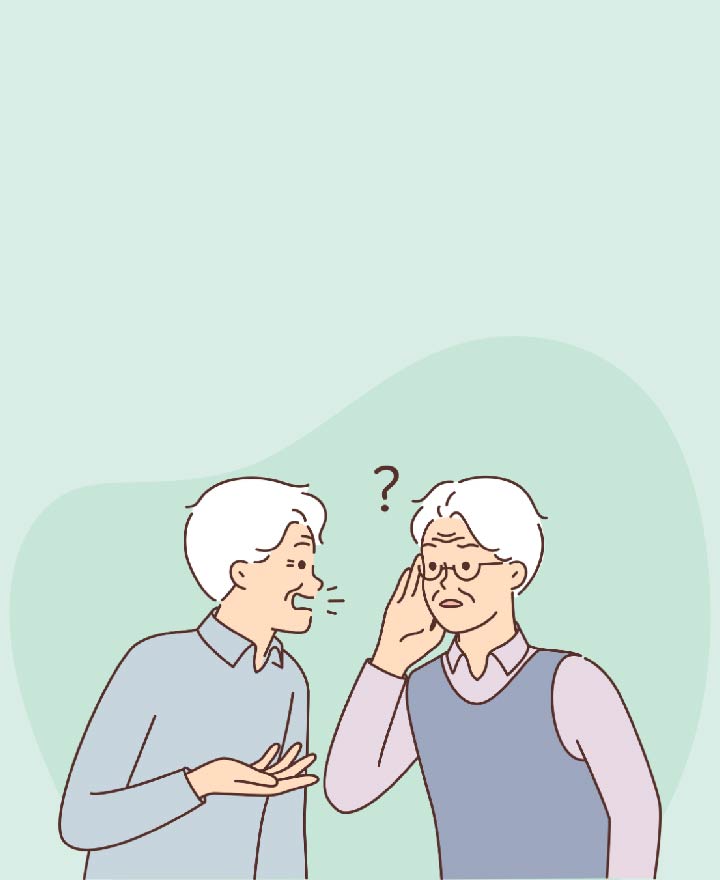

Age-Related Hearing Loss - Diagnosis, Treatment & Prevention
Age-related hearing loss also known as Presbycusis affects around half of the population over the age of 75. While this condition cannot be reversed, there is treatment options available which can help enhance hearing ability and improve the quality of life. Read on to know more.
What Is Age-Related Hearing Loss?
Age-related hearing loss (presbycusis) is the loss of hearing that gradually occurs in most of us as we grow older. It is one of the most common conditions affecting older and elderly adults.
In most cases, the hearing loss affects both ears. It can begin as early as a person's thirties or forties and worsens gradually over time.
Diagnosis
Visit your health care provider as soon as you experience symptoms of hearing loss. They will use an otoscope to check whether there is any damage in the eardrum or blockage in the ear canal due to ear wax, inflammation, or infection. In cases if your condition is worse, then they will refer you to an audiologist who will perform a hearing test to determine the degree of your hearing loss and recommend the suitable hearing aid or treatment accordingly. Your audiologist may perform one of these tests to diagnose your hearing loss:
● Traditional pure tone test
● Bone conduction test
● Speech recognition test
● Speech in noise test
● Tympanometry test
Treatment
The type of treatment you will require to overcome your hearing loss varies depending on your age and the degree of hearing loss you have. There are a number of devices and aids that help you hear better when you have hearing loss. Here are the most common ones:
● Hearing aids - these are considered the best solution for most types of hearing loss. Even adults aged 70 and older can benefit from wearing hearing aids. There are different types of hearing aids to select from. Discuss your options with your audiologist and choose the one that suits your lifestyle, hearing ability, and budget.
● Cochlear Implants – These are small electronic devices surgically implanted in the inner ear that help provide a sense of sound to people who are profoundly deaf or hard-of-hearing.
● Bone Anchored Hearing Systems – They bypass the ear canal and middle ear, and are designed to use your body's natural ability to transfer sound through bone conduction.
● Assistive Listening Devices – This includes telephone and cell phone amplifying devices, smart phone or tablet "apps," and closed-circuit systems (hearing loop systems) in places of worship, theaters, and auditoriums.
● Lip reading or Speech reading – This is another option that helps people with hearing problems follow conversational speech. Special trainers can help you learn how to lip read or speech read.
Prevention
The following steps can help you prevent noise-induced hearing loss and avoid worsening of age-related hearing loss:
• Protect your ears by limiting the duration and intensity of your exposure to noise. In the workplace, plastic earplugs or glycerin-filled earmuffs can help protect your ears from damaging noise.
• Consider regular hearing tests if you work in a noisy environment. If you've lost some hearing, you can take steps to prevent further loss.
• Avoid recreational risks such as riding a snowmobile, hunting, using power tools or listening to rock concerts can damage your hearing over time. Wearing hearing protectors or taking breaks from the noise can protect your ears. Turning down the music volume is helpful too.
Conclusion
Age-related hearing loss is common in elderly and is caused by a variety of genetic, medical and environmental factors. Visit your health care provider as soon as you experience symptoms of hearing loss and depending on degree of your hearing loss they will recommend suitable treatment accordingly.
One of the important components of our overall wellness is also being financially secured. Healthcare emergencies can happen any time, but a good health insurance can protect you from such uncertain situations. To know more about it, click here
Source: Healthline, Hopkins Medicine, Cleveland Clinic, Hoffmann Audiology
Disclaimer: This blog provides general information and discussions about health and related subjects. The information and other content provided in this blog, website or in any linked materials are not intended and should not be considered, or used as a substitute for, medical advice, diagnosis or treatment. Kindly contact your Doctor before starting a new medicine or health regime.
Related Articles
How To Assist Adults With Eating And Drinking
Exercising Tips For Senior Citizen -Things To Do And To Avoid
Common Causes For Limited Mobility In Senior Citizens
How to Manage Medical Expenses after Retirement
Save Tax with Senior Citizen Health Insurance under Section 80D
Published on January 12, 2023

















 Health Insurance
Health Insurance  Travel Insurance
Travel Insurance  Car Insurance
Car Insurance  Cyber Insurance
Cyber Insurance  Critical Illness Insurance
Critical Illness Insurance
 Pet Insurance
Pet Insurance
 Bike/Two Wheeler Insurance
Bike/Two Wheeler Insurance  Home Insurance
Home Insurance  Third Party Vehicle Ins.
Third Party Vehicle Ins.  Tractor Insurance
Tractor Insurance  Goods Carrying Vehicle Ins.
Goods Carrying Vehicle Ins.  Passenger Carrying Vehicle Ins.
Passenger Carrying Vehicle Ins.  Compulsory Personal Accident Insurance
Compulsory Personal Accident Insurance  Travel Insurance
Travel Insurance  Rural
Rural